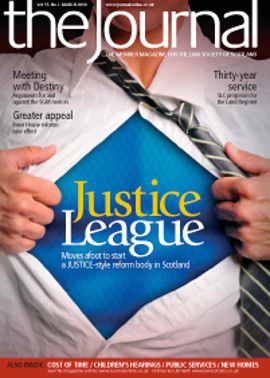ABS: time to decide

The single issue which continues to exercise practitioners is that relating to ownership of law practices by non-lawyers. The terms of the SLAS motion requisitioning a Special General Meeting confirm this.
What is “ownership”?
In response to the question whether ownership of a solicitors’ practice should be confined to solicitors, we first of all need to be clear as to what is meant by “ownership”. There are two strands which need to be distinguished.
First, there is the kind of ownership in the “owner-managed” sense where those participating in ownership of the practice are professionals (who will often be fee earners) involved in its day-to-day management. Here those professionals, or indeed non-professional members of staff, will have a proprietorial interest in the practice, whether as a partner of a traditional partnership, members of an LLP or shareholders of a limited company (we can call this “internal ownership”).
The second type, which is clearly distinguishable from internal ownership, is where the practice is owned by an outside institution and the feature of owner-management is absent (“external ownership”).
Internal ownership
Under the first scenario, in my view there can be little legitimate objection to ownership of a solicitors’ practice being shared with existing or newly recruited professionals from other disciplines. In most cases majority ownership is likely to be retained by the solicitor partners. Of course, ownership under this scenario could also arise through a merger or acquisition, which would create a true MDP, but in that case the newly created practice would still be an owner-managed business. Quite apart from the obvious incentives such a practice would create for individuals working within it, importantly it would provide the “one stop shop” service, thereby meeting the needs of the client who has a requirement for advice in a number of different areas including law, and who would prefer to receive the advice from one single firm.
Whilst the general view suggests that an internal ownership LLSP is really only of relevance to the larger firms, this is not necessarily the case. My own firm is relatively small by Edinburgh standards, but we have a number of non-lawyers whose backgrounds and specialisms are in accountancy, banking, IT and marketing, so we are already the type of firm that could conceivably capture the opportunities provided by an internal ownership LLSP.
The main areas of concern of opponents of LLSPs relate to the loss of independence and integrity of solicitors, and, more specifically, to the public interest duties of solicitors and the possibility of these duties being diminished by solicitors practising within an LLSP. Under the internal ownership scenario, it would appear that these concerns are of limited relevance. The participators in an LLSP would, in most cases, be subject to, or at least used to, professional rules concerning their own conduct of a kind which are very likely to be of a standard comparable to those applicable to solicitors. It is also difficult to see how these non-lawyer professionals would act any differently from solicitors in putting the interests of the client first before their own personal interests and/or the interests of the LLSP. To my mind, the bill largely addresses these concerns.
External ownership
Turning to external ownership, here “Tesco law” applies and this is the area which has tended to cause the most heated debates. The idea of a FTSE constituent supermarket or bank either owning a law firm or providing direct legal services is of natural concern to solicitors. The advantages of the deregulation here are different to those of an internal ownership practice. Large commercial firms are likely to be the beneficiaries by being able to attract external investment, while from a client’s perspective private clients will be able to purchase commoditised legal services perhaps online, without actually having to visit a solicitor.
The main areas of concern referred to above are arguably much more relevant in the case of an external ownership practice, where it is easy to visualise a situation where the accepted professional standards of a solicitor and the solicitor’s duty to the client are compromised, or at least are in conflict with the obligations the solicitor owes to the external owner. To some extent, the bill addresses these issues by requiring LLSPs to comply with specific professional principles including acting in the best interests of clients etc. However, in my view consideration should be given to entrenching this principle so that there is a statutory requirement to include as an express term under the solicitor’s contract of employment/service agreement with the external owner, an acceptance on the part of the external owner that because of a solicitor’s primary duty to their client, there may be situations where the solicitor may not be able to act in conformity with the instructions and/or internal policies of the external owner and therefore possibly contrary to the financial interests of the LLSP.
The whole issue of ABS creates many challenges for the profession. However, in my view the opportunities which they create exceed the threats and we should now accept that LLPSs will very soon be with us and face the challenges with innovation and imagination.
- Stuart Duncan is a partner with Davidson Chalmers LLP
At the AGM of the Law Society of Scotland (LSS) in 2008 there was a vote for ABS. A lot has changed in the interim period with the credit crunch and recession.
The starting point for any discussion on ABS is whether it is compatible with the standards and duties of a solicitor. The “Standards for Scottish Solicitors” booklet, published 2009, lists independence as a central standard.
It states: “When providing a legal service, a solicitor must be independent and must not be influenced by inappropriate or illegal considerations. These include the possibility of unreasonable pressure being put on the solicitor”. It seems impossible to avoid the risk of control by people with dishonest motives. Criteria need to be objective, like a criminal conviction for dishonesty, and not subjective, e.g. based on unsubstantiated suspicion however generally held.
Can we honestly say that banks are a suitable body to control solicitors’ firms? Boardroom greed is endemic and light touch regulation is a failure of massive proportions. There is a sales culture in banks visible in branches. A sales culture is very different from one based on service to the client and putting the interests of clients first.
Are supermarkets suitable bodies? The intention seems to be to replace thousands of solicitor firms in High Street practices in competition with one another, with a few large English based supermarkets. How is that fair competition?
For the past 25 years the sale of ever expanding financial service products has been subject to conduct of business rules (CBR) – rules designed to restrain the sales cultures of such institutions by imposing duties on sales teams to provide information and adopt a duty of care to customers. Those rules have not prevented the widespread mis-selling of endowments, home income plans, personal pensions, payment protection insurance, and of split capital bonds.
These institutions are fit persons according to the FSA and would no doubt qualify as fit to own ABSs. They have demonstrated a singular disregard for the real interests of customers. There can be no confidence that allowing them into the legal services market with the veneer of qualified solicitor involvement will not result in further mis-selling in the future.
Since the Government owns more than 50% of some banks and large proportions of others, how will solicitors ensure they are free of Government control? It is ironic that the SNP should be introducing a policy which gives control to the UK Government over some Scottish legal practices.
I paraphrase from the recent book entitled Law, Practice and Conduct for Scottish Solicitors, by Alan Paterson and Bruce Ritchie. They summarise the following dangers for the profession and for society of MDP control by non-lawyers:
The dangers
1. It undermines the collegiate nature of the legal profession and its core values:
- competence
- independence
- confidentiality
- loyalty
- access to justice
- commitment to the rule of law.
2. It undermines protection to clients:
- confidentiality
- independence
- the Guarantee Fund.
3. It creates conflicts of interest while restricting client choice.
4. MDPs create major regulatory challenges:
In an MDP the assumed solution is for each profession to regulate its own members.
However, transparency – telling the clients the different standards by which each member of staff dealing with their business is governed – is impracticable. It is a recipe for confusion if a complaint arises.
The notion that only some personnel in an MDP are covered by legal professional privilege or the Guarantee Fund shows how unrealistic such a proposition is.
The public interest clearly requires a single set of standards and single regulatory framework for all partners in an MDP.
There is no consensus between the professions on issues such as confidentiality and conflict of interest, nor mechanisms to achieve it covering all professions in an MDP.
Crucial questions
Immigration advisers were able to compete with solicitors but had to be regulated because of undesirable practices of advisers. Claims companies mushroomed, but many have now ceased trading and all south of the border now require to be regulated because of unfair trading practices. What guarantees are there that there will not be consumer detriment through the introduction of ABS?
The Scottish Law Agents Society (SLAS) believes the profession should have the final word on this. Following the credit crunch and recession, the failure of banks and regulatory control, and banks being controlled by the Government, the question of independence is more crucial than ever to the wellbeing of this profession and of society. Recent events require a reappraisal.
The LSS position seems to be that LSS agrees to ABS if there are solutions to independence, regulatory control, privilege and Guarantee Fund. Face it, these problems cannot be solved. The LSS position ought to be that it cannot agree to ABS since the problems of independence, regulatory control, privilege and Guarantee Fund have not been and cannot be solved.
We were told that “no change” is not an option. It is ironic that the Scottish Government is in favour of UK Government control of some Scottish solicitors’ firms. To them we should perhaps say “Independence for Scotland’s solicitors please”.
- Michael Scanlan is President of the Scottish Law Agents Society
In this issue
- When is oppression not oppression?
- PAYE penalties – another trap for employers
- Future on the line
- End o' anither auld sang?
- Rights team
- House prices rising – official
- ABS: time to decide
- Streamlining the Inner House
- When cash is king
- The shape of things to come
- Effective participation?
- Keeping tabs on the EU
- How to survive and thrive - read on
- Law reform update
- All-round support
- Family business initiative progresses
- From the Brussels office
- World IP Day approaches
- Going beyond 2010
- Need life be a pressure cooker?
- Ask Ash
- Target practice
- The essence of victim
- Moved with e-motion
- Precious words
- The future of crofting
- A clash of cultures
- If it sounds too good to be true...
- Website review
- Book reviews
- Services transformed
- Consumer Code for Home Builders
- Estate agency fixed fees: the way ahead?






